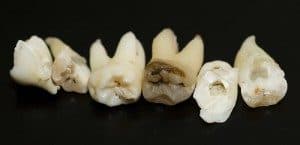One thing you don’t want to hear Dr. Khan, of Smiles Dental Studio in Sacramento, Ca, say is that she has found a cavity in one of your teeth. A dental cavity, as you probably know, is caused by decay, but another term used to indicate loss of tooth material is demineralization. This reduces the strength of the tooth’s protective layer and eats away at the minerals found there. This outer protective layer is known as the enamel, which is composed of different minerals, including hydroxyapatite, calcium, fluoride and others. The tooth is a living structure within the body, and is capable of growth and repairing itself.
Formation of a cavity.
Dental cavities get their start when there is bacterial adhesion on the surface of the tooth. Bacterial metabolism of simple carbohydrates such as glucose, lactose and sucrose will produce energy, carbon dioxide and acidic by-products. These acidic by-products, such as lactic acid, will start to dissolve the mineral layers at the microscopic level. Once dissolved, the interacting bonds between the minerals weaken to a point where they will easily be eroded and washed out. De-mineralization of the tooth begins at pH 5.5.
Bacteria in plaque accumulations.
Bacterial growth will also enhance plaque formation, which can lead to cavities and gum diseases. Bacterial grows rapidly in the mouth of someone who eats a lot of sugary treats, because those are rich in carbohydrates and other bacterial food sources. Food debris left inside the mouth after eating serves as the fuel for bacteria. Moreover, the mouth is warm and moist, a perfect breeding ground for bacterial growth.
Plaque is a complex matrix of bacteria and minerals that accumulate inside the mouth. Unfortunately, plaque contains acidic substances which are harmful to the teeth. Studies have shown that plaque layered teeth have an accelerated rate of dental cavity formation compared to teeth that are kept plaque-free. At the same time, plaque can also be a factor in bad breath, or halitosis.
Preventing cavities and tooth decay.
Dr. Khan suggests that her Sacramento, Ca patients help prevent cavities by brushing their teeth at least two to three times a day, preferably after meals. Brushing will remove the layer of bacteria on the surface of your teeth, which will reduce your chances of tooth decay and plaque formation.
Brushing also helps repair the damaged enamel layer of the tooth. Toothpastes are often rich in calcium and fluoride which both help to strengthen the enamel by depositing minerals directly onto the teeth, which can even repair the enamel layer by strengthening the mineral bonds, hence preventing the dental cavities. Calcium and fluoride also stop the process of demineralization.
Having your teeth checked and cleaned by Smiles Dental Studio in Sacramento, CA at least twice a year is your best defense against any oral problems. Brushing and flossing every day might not be enough to prevent problems- the professional staff at Smiles Dental Studio will keep your mouth at its healthiest.
